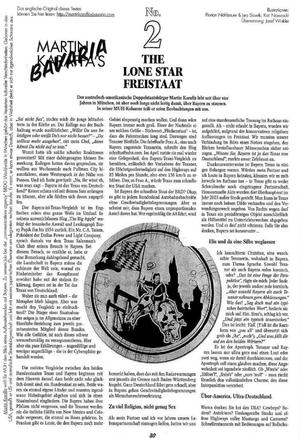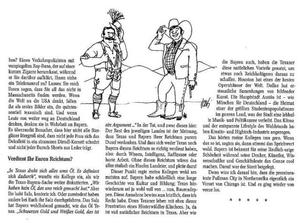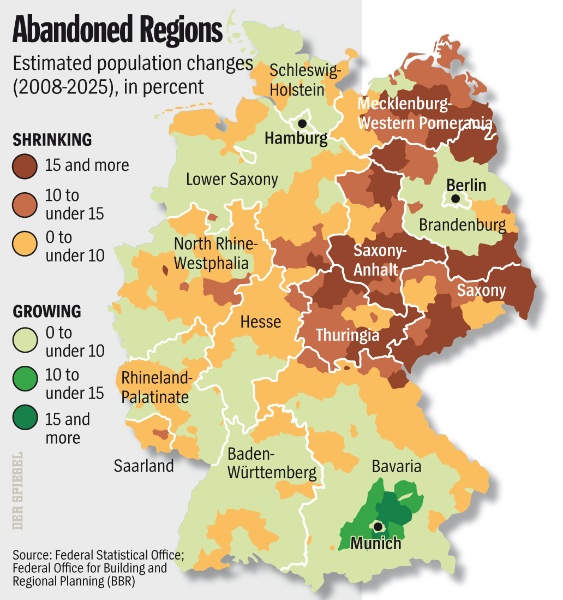As the Texas Legislature votes on a bill to raise the maximum speed limit to 85 mph (136 kph), I feel this is the appropriate time to address the similarities between Texas and Bavaria. I’ve lived in both and have grown to love both – for their charms and their quirks. But both Texas and Bavaria are considered “special” in their own nations, and I’m finding that they have quite a few amusing similarities.
We could start with the history and geography, with both being the 2nd largest states (by area) in their nation, and both being economic powerhouses. The individual GDPs of each state are larger than those of all but the top 10-20 nations, and both are considered well-diversified economies. They are large states that have big industry, innovation, and hi-tech, but also large tracts of wilderness.
But more fun are the states’ relationships with the rest of their country. If you meet a Texan or a Bavarian in a foreign country and ask where he or she is from, you’ll more often hear “Texas” or “Bavaria,” rather than “USA” or “Germany.” There is great pride in these states, and both states have their own histories and identities as separate countries, much more so than other parts of their countries. The Bavarian state, of course, goes back centuries and has its own monarchy. Bavaria rejected the West German constitution in 1949 and still refers to itself as the Free State of Bavaria. Of course the other states ratified the constitution and so the Bavarians are Germans today.
And what of the rest of the country? Yes, most Americans and Germans find Texans and Bavarians to be “special” also…and many of their fellow countrymen claim they speak strangely. Rumor has it that the Bayern Partei – the very small Bavarian political party that has Bavarian independence as its platform – received more votes from non-Bavarians than from Bavarians in the last election. Texas, too, has separatists, but they’re usually of the living in a compound, dreaming up crazy plots type, rather than organized political parties. But I think a Texas separatist party might garner some votes outside of Texas!
Beyond the position in their respective countries, are the cultures and outlooks. Both Bavarians and Texans strongly value independence and individual freedom, more so than their average countryman. Though guns are very regulated and not widespread in Germany as a whole, you find the hunters in Bavaria, and the antlers on the walls. They love the land, and contrary to the picture of big oil companies, Texas has a strong conservationist movement and leads the US in wind energy. Neither like being told by the government how fast to drive by those windmills. On the whole, both are known as staunchly conservative states relative to their neighbors, where the CSU (Christian Social Union) and Republican Party have won virtually every state and national election in recent history. Though German politics as a whole is much more to the left than American, the CSU is considered a conservative party in Germany. Not surprisingly, both also are strongly religious states.
And in their free time? Bavarians and Texans love food – especially barbecues at the lake. Floating down the river with a case of beer in summer, going to the Texas State Fair or Oktoberfest in September, shooting fireworks, drinking beer, and eating sausage...the activities are quite similar. Texans would love Schweinshaxe and spanferkel if they had it, and let’s be honest…Schnitzel and Country Fried Steak are close cousins, especially Jagerschnitzel. Both are border countries that have integrated many aspects (especially in food) from neighboring nations – perfect Neopolitan pizza is available all over Munich, and the Aperol spritz is the popular summer cocktail. I know it’s courting controversy (or heresy?), but many of the great Bavarian dishes like Kaiserschmarm are very similar to Austrian dishes, and goulash is a staple in many Bavarian restaurants. And my mouth waters at the thought of good Tex-Mex.
And finally, we have two states that often become the stereotype for their respective countries. When you ask most Americans about German culture, the ones who’ve never visited Germany would mention lederhosen, beer, pretzels, Oktoberfest, cars and sausage. While that’s not too inaccurate for a generalization of southern Bavaria, the Kölners, Berliners, and Hamburgers will strongly disagree. When you ask foreigners who have not visited the US about their impression of Americans, the boot-wearing, steak-eating, gun-toting, drawling conservative is a pretty popular stereotype.
Maybe it's the history and shared core values of freedom, or maybe it's the influence of German settlers in Texas (more than 10% of Texans have German ancestry, and you'll still see the influence down around Gruene and New Braunfels), but both places have distinct identities and traditions, and that's one of the things I've loved discovering in both states. Perhaps next time I wear my dirndl, it should be with my cowboy boots?
(For the record, I'm guilty of some generalizing here too...Bavaria is quite a diverse state, and some of the more northern areas identify themselves much more locally (especially Franconians) than as Bavarians. In fact, some of them want out of Bavaria. They do drink beer of course, but they don't wear lederhosen. And like in Texas, there's quite a difference between "city folk" and country folk.)
 Saturday, September 3, 2011 at 9:00
Saturday, September 3, 2011 at 9:00  Frau A ...
Frau A ...  2 Comments
2 Comments 






